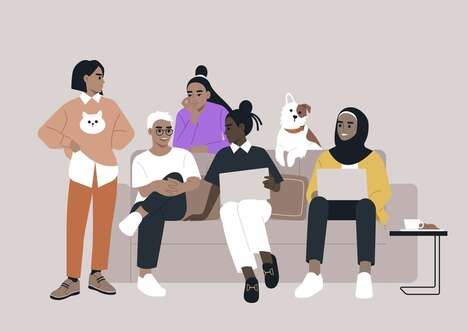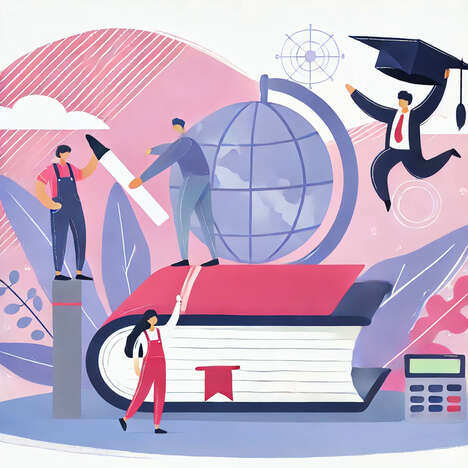Step into any office today, and you'll notice something different. As Gen Z claims their space – now making up a quarter of the workforce – they're shaking things up in ways that go far beyond the surface-level critiques we've all heard before. Remember the endless think pieces about Millennials and their avocado toast? Today's conversation about Gen Z and work needs more nuance, especially as we unpack the real changes happening in our workplaces.
A Perfect Storm of Disruption
Let's talk about what's really going on. Recent surveys show that around 60% of companies have parted ways with recent graduates within their first year. On the surface, this might sound alarming. But dig deeper, and you'll find a more complex story – one that starts with a pandemic that turned traditional career preparation on its head.
Think about it: These young professionals wrapped up their education through screens, missing out on those casual coffee chats and impromptu mentoring moments that shaped many of our early careers. They traded classroom discussions for Zoom breakout rooms and water cooler conversations for Slack channels. It's not just about missing a few in-person classes – it's about a fundamental shift in how an entire generation learned to interact professionally.
Beyond the Easy Headlines
The narrative around Gen Z at work often misses the mark. Sure, there are adjustment challenges – show me a generation that didn't have them – but focusing solely on these misses the bigger picture. These digital natives bring a refreshingly direct approach to workplace communication and an intuitive understanding of technology that many organizations desperately need.
They're asking the hard questions many of us wish we'd asked earlier in our careers: Why do we do things this way? Does this meeting really need to be an hour? What's the actual impact of my work? These aren't signs of disrespect – they're indicators of a generation that wants to make work better for everyone.
Finding Common Ground
The most successful companies aren't trying to force Gen Z into old molds – they're listening and adapting. They understand that when a new graduate questions traditional workplace norms, it's often not about avoiding work but about finding better ways to get things done.
Take communication styles, for instance. Where some see an over-reliance on digital tools, smart organizations see an opportunity to streamline information sharing and decision-making. They're creating environments where quick Slack messages can coexist with traditional meetings, where documentation is digital by default, and where flexibility doesn't mean less accountability – it means more focus on results.
Building Bridges That Last
The reality is that meaningful workplace connections look different now. As NYU professor Jonathan Haidt pointedly observes, we're facing a peculiar paradox: our most connected generation is also our loneliest. Smart organizations are responding with mentorship programs that go beyond formal check-ins, creating organic opportunities for cross-generational learning and genuine relationship building.
Moving Forward Together
The most exciting developments are happening in organizations that view Gen Z not as a problem to solve but as catalysts for overdue changes. They're creating environments where:
-Professional development feels more like growth than correction
-Digital fluency and human connection strengthen each other
-Different generational perspectives lead to better solutions
-Purpose and profit align naturally
The future of work isn't about Gen Z adapting to traditional workplace norms or vice versa – it's about creating something better together. The organizations that get this right aren't just surviving the generational shift; they're using it to create more dynamic, effective, and human workplaces for everyone.
The conversation about Gen Z in the workplace shouldn't center on what they need to change. Instead, let's focus on how their arrival might be exactly what we need to build better workplaces for all generations. After all, the best innovations often come from questioning why we do things the way we've always done them.
A Perfect Storm of Disruption
Let's talk about what's really going on. Recent surveys show that around 60% of companies have parted ways with recent graduates within their first year. On the surface, this might sound alarming. But dig deeper, and you'll find a more complex story – one that starts with a pandemic that turned traditional career preparation on its head.
Think about it: These young professionals wrapped up their education through screens, missing out on those casual coffee chats and impromptu mentoring moments that shaped many of our early careers. They traded classroom discussions for Zoom breakout rooms and water cooler conversations for Slack channels. It's not just about missing a few in-person classes – it's about a fundamental shift in how an entire generation learned to interact professionally.
Beyond the Easy Headlines
The narrative around Gen Z at work often misses the mark. Sure, there are adjustment challenges – show me a generation that didn't have them – but focusing solely on these misses the bigger picture. These digital natives bring a refreshingly direct approach to workplace communication and an intuitive understanding of technology that many organizations desperately need.
They're asking the hard questions many of us wish we'd asked earlier in our careers: Why do we do things this way? Does this meeting really need to be an hour? What's the actual impact of my work? These aren't signs of disrespect – they're indicators of a generation that wants to make work better for everyone.
Finding Common Ground
The most successful companies aren't trying to force Gen Z into old molds – they're listening and adapting. They understand that when a new graduate questions traditional workplace norms, it's often not about avoiding work but about finding better ways to get things done.
Take communication styles, for instance. Where some see an over-reliance on digital tools, smart organizations see an opportunity to streamline information sharing and decision-making. They're creating environments where quick Slack messages can coexist with traditional meetings, where documentation is digital by default, and where flexibility doesn't mean less accountability – it means more focus on results.
Building Bridges That Last
The reality is that meaningful workplace connections look different now. As NYU professor Jonathan Haidt pointedly observes, we're facing a peculiar paradox: our most connected generation is also our loneliest. Smart organizations are responding with mentorship programs that go beyond formal check-ins, creating organic opportunities for cross-generational learning and genuine relationship building.
Moving Forward Together
The most exciting developments are happening in organizations that view Gen Z not as a problem to solve but as catalysts for overdue changes. They're creating environments where:
-Professional development feels more like growth than correction
-Digital fluency and human connection strengthen each other
-Different generational perspectives lead to better solutions
-Purpose and profit align naturally
The future of work isn't about Gen Z adapting to traditional workplace norms or vice versa – it's about creating something better together. The organizations that get this right aren't just surviving the generational shift; they're using it to create more dynamic, effective, and human workplaces for everyone.
The conversation about Gen Z in the workplace shouldn't center on what they need to change. Instead, let's focus on how their arrival might be exactly what we need to build better workplaces for all generations. After all, the best innovations often come from questioning why we do things the way we've always done them.





